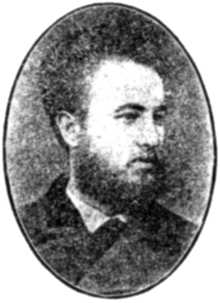Matei Donici | |
|---|---|
 Donici c. 1870 | |
| Born | 8 January 1847 |
| Died | 26 September 1921 (aged 74) |
| Nationality | Russian (1847–1917) Romanian (1918–1921) |
| Occupation(s) | Landowner, soldier, poet |
| Political party | National Moldavian Party Moldavian Progressive Party |
Matei Donici (Romanian pronunciation: [maˈtej ˈdonitʃʲ]; Russian: Матвей Степанович Донич, romanized: Matvey Stepanovich Donich; 8 January 1847 – 26 September 1921) was a Romanian poet, Imperial Russian Army general, and politician from Bessarabia. He was born at a time when his native region, as the eastern half of Moldavia, had been taken over by the Russian Empire and organized into a Bessarabia Governorate; his family belonged to Moldavian boyardom, having managed to preserve its estates. Though seeking and obtaining integration within the Russian nobility, the Donicis secretly cultivated Romanian nationalism, which shaped Matei's own outlook on politics. In the late 1860s, after flunking out of the Russian education system, he spent some time in Odesa and at his Bessarabian manor, composing poetry which spoke of Moldovans as a subset of the Romanians, and which included an all-out critique of Tsarist autocracy.
Donici tried to shun Russification, but was eventually pushed into a military career, and as such forced to maintain discretion about his nationalist ideals—though he continued to network with members of the emerging Romanian movement, including in particular the landowner Vasile Stroescu. Graduating as a cavalry cadet in 1874, Donici saw action with the Royal Serbian Army in the Serbian war of independence, and was then drafted for the Russo-Turkish War. Both conflicts also took him to the United Principalities (the core state of modern Romania), and allowed him to connect directly with mainstream Romanian literature. Receiving a head wound and permanent scar in the Battle of Shipka Pass, he continued to advance through the ranks. He was called up as a cavalry colonel for the Russo-Japanese War, but was captured by the Imperial Japanese Army. In the aftermath, he became a general.
Donici was reactivated politically by the Romanian Bessarabian caucus during the February Revolution of 1917: already in his seventies, Donici was a founding member of the National Moldavian Party (PNM) in Chișinău, and also affiliated with the Moldavian Progressive Party in Odesa. The final stages of World War I saw the union of Bessarabia with Romania; this effort was supported at an international level by his niece, Elena Donici. Donici himself was seen by the PNM ideologue Onisifor Ghibu as a rather incompetent and weak champion of the cause. He lived to see the union, but died shortly after at Tighina as a subject of the Romanian Kingdom.
